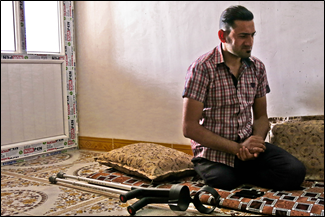For many people, accidents are simply a matter of being in the wrong place at the wrong time. Abdelillah is one of them.
“It was in 2005,” he explains to Handicap International’s psychosocial team, as they visit him in the modest home he shares with his family, in the governorate of Kirkuk. “Back then, I was living in a village in the centre of Iraq. One day, as I was walking in the street, a car bomb exploded, which was immediately followed by heavy gunfire. A bullet hit my leg and I passed out.”
“A few hours later I woke up in hospital and I realized that my leg had been amputated. I couldn’t help thinking that I hadn’t done anything to deserve this, and that there was no point in living any more. That day, I fell into a deep depression that lasted for years.”
Shwan, a psychosocial worker for Handicap International, listens patiently to Abdelillah as he continues his story.
“I had nightmares every night for months after the operation. I felt that I didn’t belong in the world anymore. People with disabilities don’t have much of a role to play in our society. In 2014, things got even worse. We had to flee our town, with my family, to escape the Islamic State, which was advancing into our region. We stayed in Baghdad for a few months, but life was too hard. So we decided to go to Kirkuk, more to the north, because it was the only situation we knew we could cope with.”
The same year, Handicap International launched an emergency response to the crisis that was tearing the country apart, and to the influx of Syrian refugees fleeing the war in their neighbouring country. In 2015, we expanded our activities in the governorate of Kirkuk, where hundreds of thousands of refugees and displaced people now live. Handicap International provides a global response that includes activities as varied as mine risk education, physiotherapy, psychosocial support and the protection of the most vulnerable individuals.
I didn't even know what psychosocial support was...I never dreamt it would change my life
 At the start of 2016, a mine risk education team knocked on Abdelillah’s door during one of its daily rounds. The organisation’s professionals immediately realised that something was wrong and suggested he take part in psychosocial support group sessions.
At the start of 2016, a mine risk education team knocked on Abdelillah’s door during one of its daily rounds. The organisation’s professionals immediately realised that something was wrong and suggested he take part in psychosocial support group sessions.
“To start with, I didn’t even know what psychosocial support was,” recalls Abdelillah. “I just went along to see what it was all about. I never dreamt the sessions would change my life. But from the first session, I understood that how I felt had a lot to do with my attitude towards life. I also realised that people were taking an interest in me and that my disability didn’t prevent them from caring about me. I also realized that other people were in the same situation as me.”
“It’s amazing how much progress Abdelillah has made in so little time,” adds Shwan. “He’s a lot more outgoing now, and more positive than he was at the start. You can really feel the impact the sessions have had on him.”
With Handicap International’s support, Abdelillah has hope again and he’s now thinking about the future. He’s planning to open his own phone shop soon, and to go back to his home village when peace returns. “If I had to give one piece of advice to other amputees,” says Abdelillah, “it would be: don’t look back, turn to the future. That’s the secret of survival.”


 At the start of 2016, a mine risk education team knocked on Abdelillah’s door during one of its daily rounds. The organisation’s professionals immediately realised that something was wrong and suggested he take part in psychosocial support group sessions.
At the start of 2016, a mine risk education team knocked on Abdelillah’s door during one of its daily rounds. The organisation’s professionals immediately realised that something was wrong and suggested he take part in psychosocial support group sessions.


